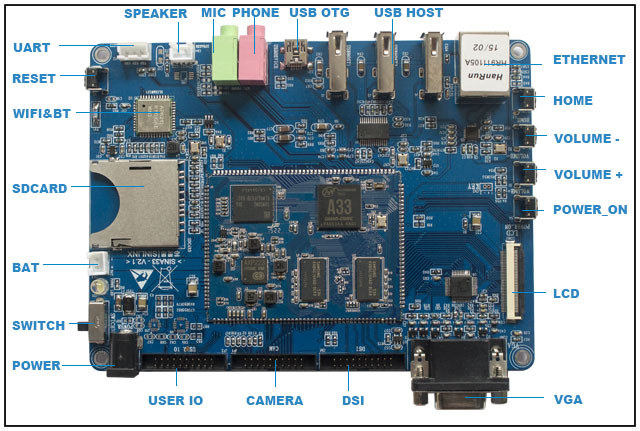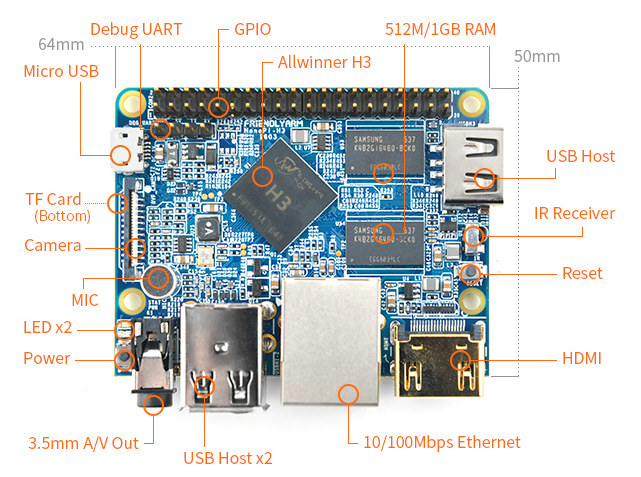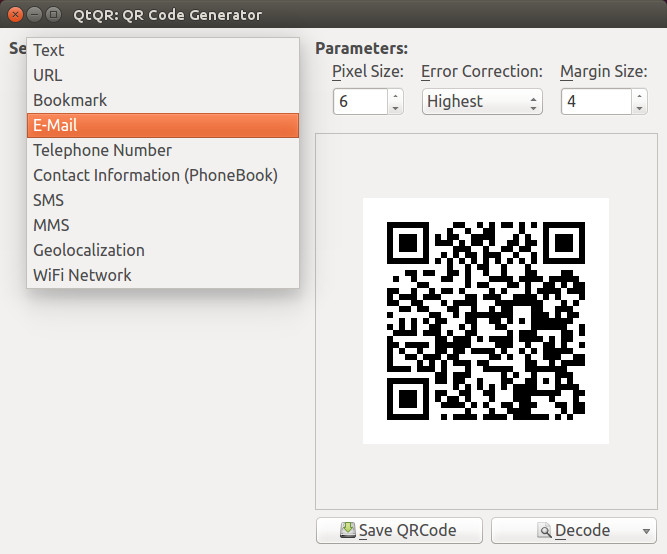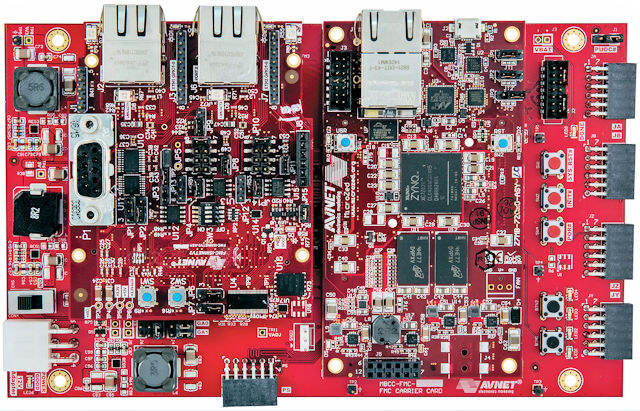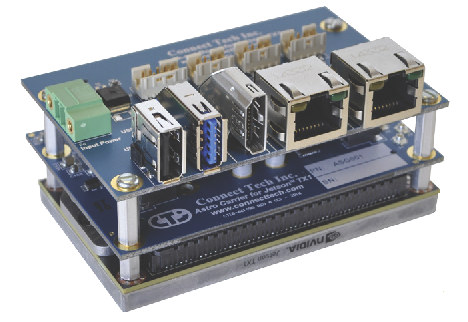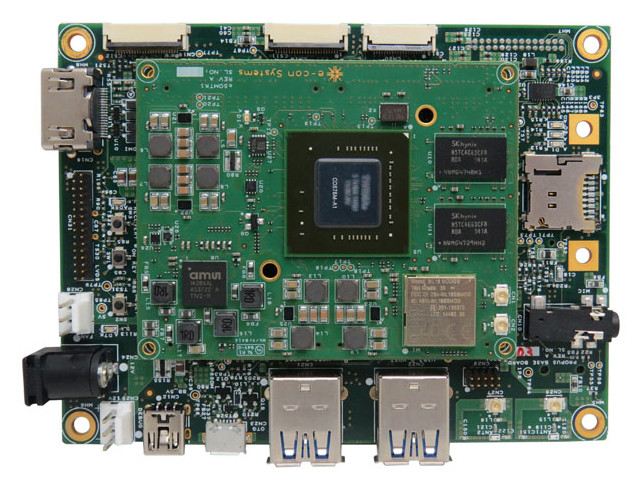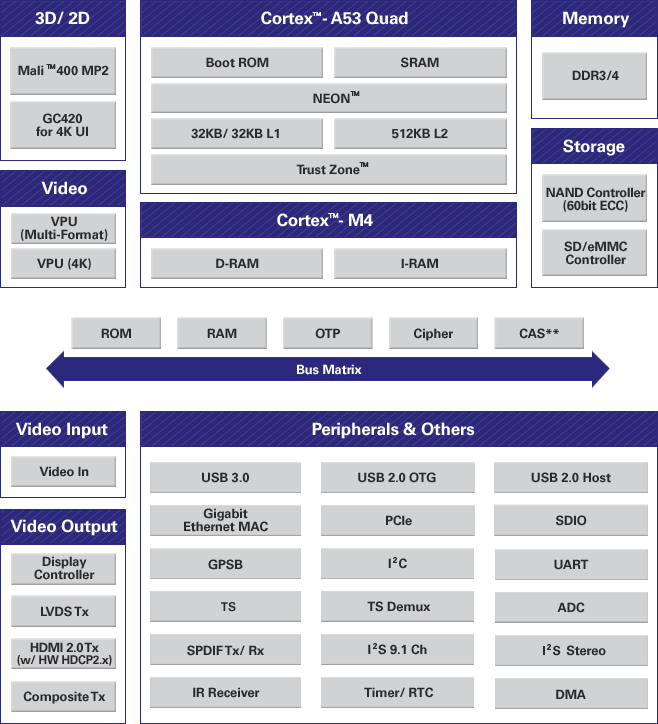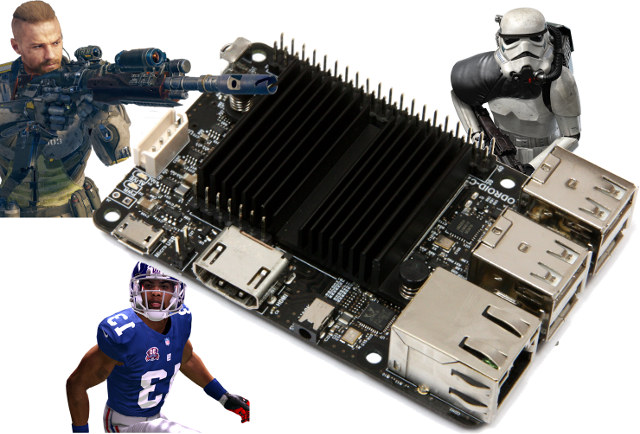Allwinner A33 has never been a popular processor for development boards and single board computers, despite its $5 price tag for a quad core processor (in 2014), as without HDMI support, it’s been mostly used in low cost Android tablets. But this morning, I’ve come across Sinlinx company on linux-sunxi mailing list, and one of their latest development board – Sinlinx SIN-A33 Plus – is based on their older Allwinner A33 and features LCD, VGA & camera interfaces, I/Os headers, Ethernet and WiFi/Bt connectivity, and various other ports. Sinlinx SIN-A33 Plus specifications: SoC – Allwinner A33 quad core Cortex-A7 @ 1.3 GHz with Mali-400MP2 GPU System Memory – 1GB DDR3 Storage – 4GB eMMC, SD card slot Video Output – LCD connector, MIPI DSI header, and VGA port Audio – 3.5mm audio jacks for microphone and headphone, speaker header Connectivity – 10/100M Ethernet, WiFi and Bluetooth USB – 3x USB […]
NanoPi M1 Allwinner H3 Development Board with HDMI, CVBS, Ethernet and 3 USB Ports Sells for $11 (Sort of)
FriendlyARM has been very busy since the beginning of the year, as they’ve already released NanoPi 2 Fire, NanoPC-T2, and NanoPi-M2 boards, all based on Samsung S5P4418 processor so far in 2016. But they’ve not stopped, as the company has now launched NanoPi M1 board powered by Allwinner H3 processor with a similar form factor as NanoPi-M2, similar features as Orange Pi One, except they added two extra USB ports, an AV port with composite video and stereo audio, an on-board microphone, and an IR receiver. NanoPi-M2 board specifications (highlights show improvements or differences over Orange Pi One): SoC – Allwinner H3 quad core Cortex A7 @ 1.2 GHz with an ARM Mali-400MP2 GPU up to 600 MHz System Memory – 512 MB DDR3 (1GB as option) Storage – micro SD card slot Video & Audio Output – HDMI and 3.5mm jack for CVBS (composite + stereo audio) Connectivity -10/100M […]
Decode or Generate QR Codes in Ubuntu with QtQR and zbar-tools
Sometimes I’ve found myself having to decode a QR code on my computer, and usually I’d just get my Android smartphone, use a QR code app to decode it, and send the results to my computer by email. It works, but wouldn’t it be better to simply do this straight from my computer instead? After a few minutes searching, I eventually found out QtQR graphical utility that can both generate and decode QR codes. In Ubuntu and Debian, you can install it as follows:
|
1 |
sudo apt-get install qtqr |
You can create a QR code with a given pixel size and level of error correction for text, URL, bookmark, email, phone number, SMS/MMS, WiFi network, and so on, and then use the Save QRCode button to save the resulting picture. If instead you simply want to decode a QR code from an image or your webcam use the Decode button, and the tool will […]
Avnet Introduces Zynq Based MicroZed Industry 4.0 / IIoT Ethernet Kit
There’s a lot of buzz around IoT, and the industrial sector is also trying to build smarter factories using protocols or standards part of Industry 4.0 or Industrial IoT (IIoT) depending on the country or group you belong too. Avnet has just launched MicroZed Industry 4.0 Ethernet Kit (I4EK) based on Xilinx Zynq-7000 ARM & FPGA SoC to address this market with support for the most common industrial protocols such as EtherCAT, Powerlink, PROFINET RT/IRT, EtherNet/IP, and Modbus-TCP. The “brain” of the development board is MicroZed module powered by Zilinx Zynq-7020 dual core Cortex A9 processor with FPGA fabric, and coupled with 1GB RAM, 128 MB SQPI flash, a Gigabit Ethernet port, and various I/Os. The module is connected to MicroZed FMC Carrier board with the following features: 2x 100-pin board-to-board MicroHeaders Xilinx PC4 header for download/debug – Accesses PL JTAG 5x Digilent Pmod compatible interfaces 39 user I/O 1x […]
Astro Carrier & XBG201 Breakout Boards Are Designed for Nvidia Jetson TX1 Module
Nvidia unveiled Jetson TX1 system-on-module powered by their latest Tegra X1 processor, as well as a carrier board that fits into a mini-ITX case at the end of last year. However, if you need something more compact and lightweight, Connect Tech designed Astro Carrier baseboard for Jetson TX1 module with about the same size, as well as a breakout board with connectors that can be customized as needed. Astro Carrier (ASG001) board specifications: SoM Connector – Samtec “SEARAY” high density board to board connector for Jetson TX1 module Breakout board connectors – 3x 60-pin high density connectors with HDMI, SATA, 2x Gigabit Ethernet (10/100/1000), 1x USB 3.0, 2x USB 2.0, 2x RS-232/RS-485, 2x camera (CSI4), 4x GPIO…… Storage – micro SD slot On-board connectivity – GbE magnetics + Intel 82574 GbE PHY + magnetics Video I/Os 8x u.FL video inputs GMSL (Gigabit Multimedia Serial Link) signaling via 2x MAX9286 deserializer […]
e-Con Systems Propus Nvidia Tegra K1 Development Board Features 3 MIPI-CSI Camera Interfaces
I mostly know e-Con Systems because of their camera modules, but the Indian company has also been manufacturing system-on-modules and development kits, and has just launched Propus development board based on their eSOMTK1 computer-on-module powered by Nvidia Tegra K1 quad core Cortex A15 processor, and including three camera interfaces with two 4-lane and one 1-line MIPI-CSI2 connectors. Propus specifications: Computer-on-module – eSOMTK1-F16G-R2G-WB-IM: SoC – Nvidia Tegra K1 4-plus-1 ARM Cortex-A15 processor @ up to 2.3 GHz with 192-core Kepler GPU. System Memory – 2GB 64-bit DDR3L SDRAM Storage – 16GB eMMC flash Connectivity – 802.11 a/b/g/n and Bluetooth 4.1 module with 2 u.Fl antenna connectors Sensors – 3D digital accelerometer and a 3D digital gyroscope (6 axis) Power Management IC (5V and 12V inputs) SoM connectors – 4x 100-pin board to board connectors Storage – SATA connect, micro SD slot Video Output – 1x HDMI 1.4 Audio – Audio Codec […]
Telechips TCC898x (Alligator) 64-bit ARM SoC is Designed for High-end 4K Set-Top Boxes
Telechips processors were often found in consumer devices such as Android tablets, mini PCs and TV Sticks a few years ago, but it’s been a while since I have seen a devices based on Telechips. So after seeing an automotive SoC from the company, I decided to visit the company website to check if they were still designing processors for the consumer market, and found TCC898x quad core Cortex A53 processor for “Smart Stick, IP-Client and STB with 4K 60fps decoding” with some interesting features. Telechips TCC898x SoC specifications: CPU- Quad core Cortex A53 processor with NEON, TrustZone, 32KB/32KB L1 cache and 512KB L2 cache MCU – Cortex-M4 micro-controller GPU 2D – Vivante GC420 composition processing core for 4K user interfaces 3D – ARM Mali-400MP2 VPU – Multi-format VPU and 4K VPU with HEVC and VP9 support Memory I/F – DDR3/4 Storage I/F – NAND controller (60-bit ECC), SD/eMMC controller […]
Play High-end PC Games on ARM Linux Boards with Moonlight Embedded
Nvidia first showcased PC games streaming to Nvidia Project SHIELD Game Console at CES 2013, and since then Moonlight project has been created to provide an open source implementation compatible with Nvidia Gamestream, and supported on Linux, Mac OS and Windows PC, Android & iOS mobile devices, as well as Samsung VR kits. There’s also an implementation called Moonlight Embedded designed for ARM Linux platforms such as Raspberry Pi,ODROID, Cubox-i boards, and ODROID-C1 and ODROID-C2 boards even got support for H.265 streaming very recently allowing for better quality over H.265 at a given bit rate, and possibly 4K @ 60 Hz gaming on ODROID-C2 board. You’ll need a Windows gaming PC with an Nvidia GTX 600/700/900 series GPU, a wired connecting or a high-end 802.11 router or greater, and Nvidia Geforce Experience (GFE) installed on your PC. H.265 requires an Nvidia 900 series GPU such as Nvidia GTX960. Once this […]


